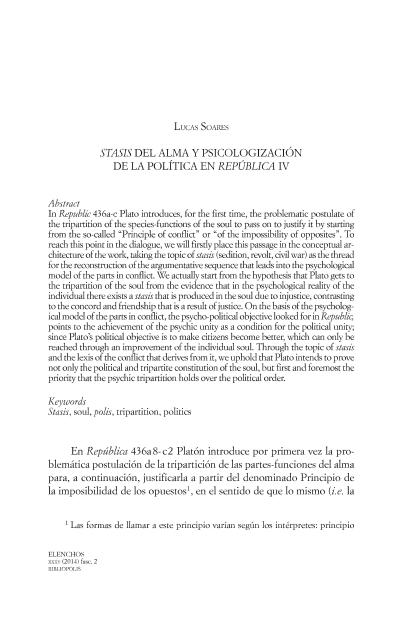Artículo
"Stasis" del alma y psicologización de la política en "República IV"
Fecha de publicación:
04/2015
Editorial:
Bibliopolis
Revista:
Elenchos (Napoli)
ISSN:
0392-7342
Idioma:
Español
Tipo de recurso:
Artículo publicado
Clasificación temática:
Resumen
In "Republic" 436a-c Plato introduces, for the first time, the problematic postulate of the tripartition of the species-functions of the soul to pass on to justify it by starting from the so-called "Principle of conflict" or ""of the impossibility of opposites". To reach this point in the dialogue, we will firstly place this passage in the conceptual architecture of the work, taking the topic of "stasis" (sedition, revolt, civil war) as the thread for the reconstruction of the argumentative sequence that leads into the psychological model of the parts in conflict. We actually start from the hypothesis that Plato gets to the tripartition of the soul from the evidence that in the psychological reality of the individual there exists a "stasis" that is produced in the soul due to injustice, contrasting to the concord and friendship that is a result of justice. On the basis of the psychological model of the parts in conflict, the psycho-political objective looked for in "Republic", points to the achievement of the psychic unity as a condition for the political unity; since Plato's political objective is to make citizens become better, which can only be reached through an improvement of the individual soul. Through the topic of "stasis" and the lexis of the conflict that derives from it, we uphold that Plato intends to prove not only the political and tripartite constitution of the soul, but first and foremost the priority that the psychic tripartition holds over the political order.
Palabras clave:
Stásis
,
Alma
,
Psicología
,
Política
Archivos asociados
Licencia
Identificadores
Colecciones
Articulos(SEDE CENTRAL)
Articulos de SEDE CENTRAL
Articulos de SEDE CENTRAL
Citación
Soares, Lucas; "Stasis" del alma y psicologización de la política en "República IV"; Bibliopolis; Elenchos (Napoli); 35; 2; 4-2015; 251-268
Compartir




